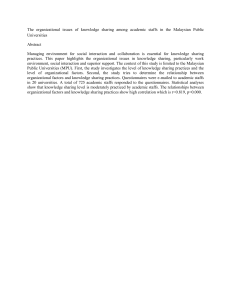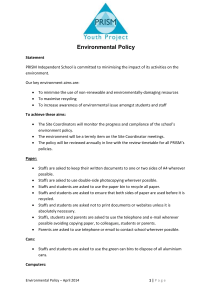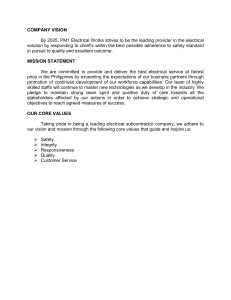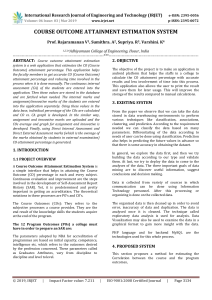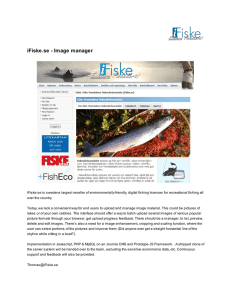IRJET- Edu-Web
advertisement
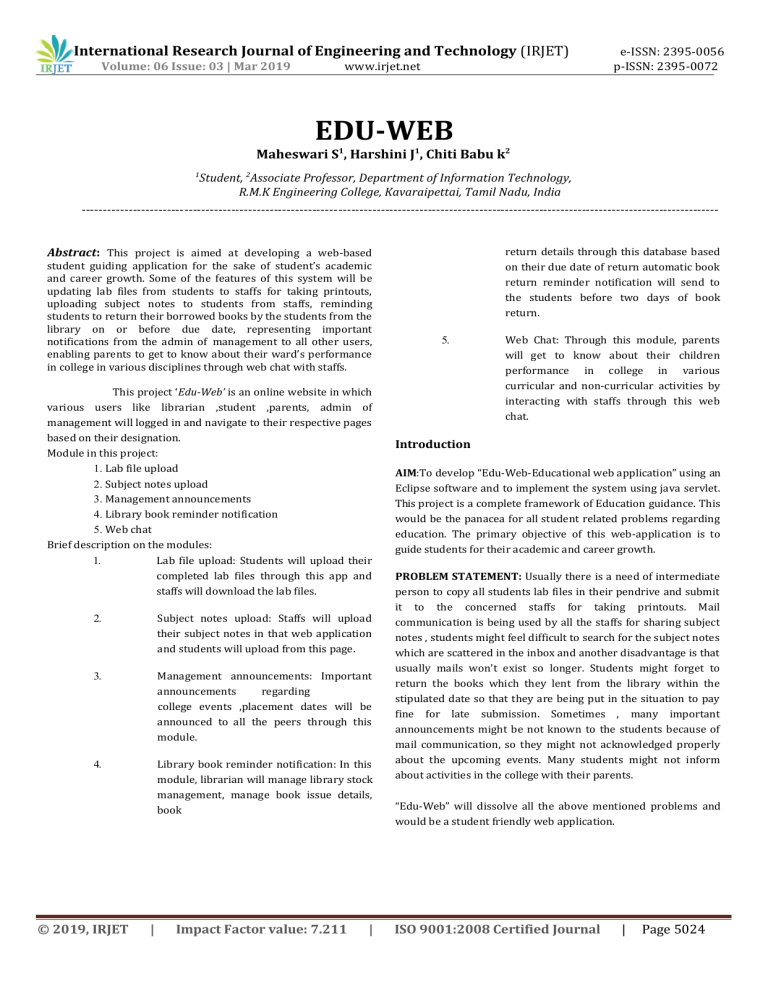
International Research Journal of Engineering and Technology (IRJET) Volume: 06 Issue: 03 | Mar 2019 www.irjet.net e-ISSN: 2395-0056 p-ISSN: 2395-0072 EDU-WEB Maheswari S1, Harshini J1, Chiti Babu k2 1 Student, 2Associate Professor, Department of Information Technology, R.M.K Engineering College, Kavaraipettai, Tamil Nadu, India ----------------------------------------------------------------------------------------------------------------------------------------------------- Abstract: This project is aimed at developing a web-based student guiding application for the sake of student’s academic and career growth. Some of the features of this system will be updating lab files from students to staffs for taking printouts, uploading subject notes to students from staffs, reminding students to return their borrowed books by the students from the library on or before due date, representing important notifications from the admin of management to all other users, enabling parents to get to know about their ward’s performance in college in various disciplines through web chat with staffs. This project ‘Edu-Web’ is an online website in which various users like librarian ,student ,parents, admin of management will logged in and navigate to their respective pages based on their designation. Module in this project: 1. Lab file upload 2. Subject notes upload 3. Management announcements 4. Library book reminder notification 5. Web chat Brief description on the modules: 1. Lab file upload: Students will upload their completed lab files through this app and staffs will download the lab files. 2. Subject notes upload: Staffs will upload their subject notes in that web application and students will upload from this page. 3. Management announcements: Important announcements regarding college events ,placement dates will be announced to all the peers through this module. 4. Library book reminder notification: In this module, librarian will manage library stock management, manage book issue details, book © 2019, IRJET | Impact Factor value: 7.211 | return details through this database based on their due date of return automatic book return reminder notification will send to the students before two days of book return. 5. Web Chat: Through this module, parents will get to know about their children performance in college in various curricular and non-curricular activities by interacting with staffs through this web chat. Introduction AIM:To develop “Edu-Web-Educational web application” using an Eclipse software and to implement the system using java servlet. This project is a complete framework of Education guidance. This would be the panacea for all student related problems regarding education. The primary objective of this web-application is to guide students for their academic and career growth. PROBLEM STATEMENT: Usually there is a need of intermediate person to copy all students lab files in their pendrive and submit it to the concerned staffs for taking printouts. Mail communication is being used by all the staffs for sharing subject notes , students might feel difficult to search for the subject notes which are scattered in the inbox and another disadvantage is that usually mails won’t exist so longer. Students might forget to return the books which they lent from the library within the stipulated date so that they are being put in the situation to pay fine for late submission. Sometimes , many important announcements might be not known to the students because of mail communication, so they might not acknowledged properly about the upcoming events. Many students might not inform about activities in the college with their parents. “Edu-Web” will dissolve all the above mentioned problems and would be a student friendly web application. ISO 9001:2008 Certified Journal | Page 5024 International Research Journal of Engineering and Technology (IRJET) Volume: 06 Issue: 03 | Mar 2019 www.irjet.net SOFTWARE REQUIREMENT SYSTEM INTRODUCTION: “Edu Web” is an interface between many peers like students, staffs, parents, librarian admin of the management in various college activities. It aims at being student friendly and being the panacea for their problems. PURPOSE OF THE REQUIREMENT DOCUMENT: Every student would surf through their mails completely for getting subject notes and important announcements. They might also depend upon the third person to act as intermediate between them and staffs for copying their lab files in their pendrive and handover to the concerned staffs for taking printouts. All these problems will be solved through “subject files upload, lab file upload, announcements module”. Mostly all the students would forget their date of return of the lent library books to the library, so they ought to pay fine for the late submission. Through library book reminder module, each students will be notified about their due date before two days of book return, so they will be prevented from paying fine. SCOPE OF THE PRODUCT: ● Through Library book reminder notification, students will receive notification of the books borrowed by them to submit it on or before the stipulated date, eliminating the need of paying fine for late submission. ● Through Management announcement module, students will receive all the important notification from their college management regarding exam dates, results and company details for recruitment process. ● Using subject files upload module, students could receive all the softcopy of the subject notes under a single module, thereby eliminating the need to explore all mails to seek the subject notes which might be sent by the staffs, many months ago. ● Through lab files upload module, students could send their lab files directly to the concerned staffs, eliminating the third person to collect all the lab files from n number of students by copying it in pen-drive and handle it to the concerned staffs for taking printout. ● Web chat module allows parents to interact with the staffs to get to know about their ward’s performance in the college. Staffs could also make reviews and reports about student performance in academic, other extracurricular activities. DEFINITION,ACRONYMS & ABBREVIATIONS: HTML : Markup Language used for creating web pages. © 2019, IRJET | Impact Factor value: 7.211 | e-ISSN: 2395-0056 p-ISSN: 2395-0072 J2EE : Java 2 Enterprise Edition is a programming platform java platform for developing and running distributed java applications. HTTP : HyperText Transfer Protocol. TCP/IP : Transmission Control Protocol/Internet Protocol is the communication protocol used to connect hosts on the Internet. MYSQL : It is an open source relational Database Management System that is used for creating queries for the web page. (Unified Modeling Language): It is a standard for writing software blueprints. The UML may be used to visualize, specify, construct and document. WEB 2.0: It is commonly associated with web applications which facilitate interactive information sharing, interoperability, user-centred design and collaboration on the World Wide Web. REFERENCES: ● ● ● ROGER.S.PRESSMAN ,”Software engineering – a th practitioner’s approach” 7 edition. Applying UML & patterns CRAIG LARMAN 3rd edition. IEEE Software Requirement Specification format. TECHNOLOGIES TO BE USED MYSQL : My Structured Query Language MYSQL SERVER : MYSQL 8.0.15 Server ● JSP: JavaServer Pages LANGUAGES TO BE USED: ● HTML - for Front end design ● CSS -for Front end design ● JavaScript -for Front end scripting ● JAVA(JSP,SERVLET) -for back end connection ● SQL -to query the web page OVERALL DESCRIPTION: 3.1 SOFTWARE INTERFACE: CLIENT ON INTERNET Web browser, operating system(any)CLIENT ON INTRANET Web browser, ● ISO 9001:2008 Certified Journal | Page 5025 International Research Journal of Engineering and Technology (IRJET) Volume: 06 Issue: 03 | Mar 2019 www.irjet.net operating system(any) WEB SERVER MYSQL SERVER,APACHE TOMCAT SERVER, operating system(any) DATABASE SERVER: MYSQL, operating system(any) DEVELOPMENT END: HTML, Java Script, CSS, JAVA ,MYSQL ,OS(Windows) e-ISSN: 2395-0056 p-ISSN: 2395-0072 ISSUE BOOK AND RETURN 3.2SOFTWARE/HARDWARE TOOLS: BROWSERS: 1.chrome 2. Edge 3.Mozilla Firefox .4.InternetExplorer. BROWSER CONFIGURATION: 1. JavaScript must be enabled. 2. Cookies must be enabled. 3. Pop-up windows must be enabled. MANAGEMENT NOTIFICATION MODULE: Management will send important notifications like important circulars regarding exam results and company details placement regardings.Students receive .notification from management periodically. 3.3 APPLICATION FLOW: 3.3.1.1 LIBRARY NOTIFICATION MODULE: ANNOUNCEMENT PAGE: In this module, students will receive notification automatically generated using the id of the books and register number of the student. LIBRARY MODULE STUDENT NOTES UPLOAD MODULE Staffs will send their subject soft copy notes to the student though this application.Students will receive notes under on roof(application) DOWNLOAD: ADD BOOKS: © 2019, IRJET | Impact Factor value: 7.211 | ISO 9001:2008 Certified Journal | Page 5026 International Research Journal of Engineering and Technology (IRJET) Volume: 06 Issue: 03 | Mar 2019 www.irjet.net e-ISSN: 2395-0056 p-ISSN: 2395-0072 LAB FILES UPLOAD MODULE: • Through this module, Students will upload their lab files to the concerned staffs for taking printouts.Staffs while receiving files, will take printouts and distribute to the students. WEB CHAT MODULE:• Web chat allows web interaction between parents and staffs . • This will allow parents to get information about their ward’s progress. • Staffs can also make reviews and reports about the students performance in academics , other extra-curricular activities. CHAT APPLICATION: © 2019, IRJET | Impact Factor value: 7.211 | ISO 9001:2008 Certified Journal | Page 5027 International Research Journal of Engineering and Technology (IRJET) Volume: 06 Issue: 03 | Mar 2019 www.irjet.net TESTING: Software testing is the evaluation of the software against requirements gathered from users and system specifications. Testing is conducted at the phase level in software development life cycle or at module level in program code. Software testing comprises of validation and verification. SOFTWARE VALIDATION: Validation is process of examining whether or not the software satisfies the user requirements. It is carried out at the end of the SDLC. If the software matches requirements for which it was made, it is validated. ● Validation ensures the product under development is as per the user requirements. ● Validation answers the question –“Are we developing the product which attempts all the user needs from this software?”. ● Validation emphasizes on user requirements. SOFTWARE VERIFICATION: Verification is the process of confirming if the software is meeting the business requirements, and is developed adhering to the proper specifications and methodologies. ● Verification ensures the product being developed is according to design specifications. ● Verification answers the question –“Are we developing this product by firmly following all design specifications?”. ● Verifications concentrates on the design and system specifications. Target of the tests are – ● Errors: These are actual coding mistakes made by developers. In addition, there is a difference in output of software and desired output, is considered as an error. ● Faults: When error exists fault occurs. A fault, also known as a bug, is a result of an error which can cause system to fail. ● Failure: Failure is said to be the inability of the system to perform the desired task.Failure occurs when fault exists in the system e-ISSN: 2395-0056 p-ISSN: 2395-0072 MANUAL VS AUTOMATED TESTING: Testing can either be done manually or using an automated testing tool: ● Manual: This testing is performed without taking help of automated testing tools. The software tester prepares test cases for different sections and levels of the code, execute the tests and reports the result to the manager. Manual testing is time and resource consuming. The tester needs to confirm whether or not right test cases are used. Major portion of testing involves manual testing. ● Automated: This testing procedure done with aid of automated testing tools. The limitations with manual testing can be overcome using automated test tools. A tests needs to check if a webpage can be opened in Internet Explorer. This can be easily done with manual testing. But to check if the web-server can take the load of 1 million users, it is quite impossible to test manually. There are software and hardware tools which helps tester in conducting load testing, stress testing, regression testing. TESTING APPROACHES: Tests can be conducted based on two approaches● Functionality testing. ● Implementation testing. When functionality is being tested without actual implementation in concern it is known as black-box testing. The other side is known as white-box testing where not only functionality is tested but the way it is implemented is also analyzed. Exhaustive tests are the best desired method for perfect testing. Every single possible value in the range of the input and output values is tested. It is not possible to test each and every value in real world scenario if the range of values is large. BLACK-BOX TESTING: It is carried out to test the functionality of the program. It is also called ‘Behavioral’ testing. The tester in this case, has a set of input values and respective desired results. On providing input, if the output matches with the desired results, the program is tested ‘ok’, and problematic otherwise. In this testing method, the design and structure of the code are not known to the tester, and testing and end users conduct this test on the software. Black-box testing techniques● Equivalence class: The input is divided into similar classes. If one element of a class passes the test, it assumes that all the class is passed. ● Boundary values: The input is divided into higher and lower end values. If these values pass the test, it is assumed that all values in between may pass too. ● Cause effect graphing: In both previous methods, only one input value at a time is tested. Cause(input)-effect(output) is a testing technique where combinations of input value are tested in a systematic way. ● Pair- wise Testing: The behaviour of software depends on multiple parameters. In pair-wise testing, the multiple parameters © 2019, IRJET | Impact Factor value: 7.211 | ISO 9001:2008 Certified Journal | Page 5028 International Research Journal of Engineering and Technology (IRJET) Volume: 06 Issue: 03 | Mar 2019 www.irjet.net are tested pair-wise for their different values. ● State- based testing: The system changes state on provision of input. These systems are tested based on their states and input. WHITE-BOX TESTING: It is conducted to test program and its implementation, in order to improve code efficiency or structure. It is also known as ‘Structural testing’. In this testing method, the design and the structure of the code are known to the tester. Programmers of the code conduct this test on the code. The below are some white box testing techniques : ● Control -flow testing: The purpose of the control-flow testing to set up test cases which covers all statements and branch conditions. The branch conditions are tested for both being true and false, so that all statements can be covered. ● Data -flow testing: This testing technique emphasis to cover all the data variables included in the program. It tests where the variables were declared and defined and where they were used or changed. TESTING LEVELS: Testing itself may be defined at various levels of SDLC. The testing process runs parallel to software development. Before jumping on the next stage, a stage is tested , validated and verified. Testing separately is done just to make sure that there are no hidden bugs or issues left 9n the software. Software is tested on various levels. UNIT TESTING: While coding, the programmer performs some tests on that unit of program to know if it is error free. Testing is performed under white-box testing approach. Unit testing helps developers decide that individual units of the program are working as per requirement and are error free. INTEGRATION TESTING: Even if the units of software are working fine individually, there is a need to find out if the units if integrated together would also work without errors. For example, argument passing and data updation etc. SYSTEM TESTING: The software is compiled as product and then it is tested as a whole. This can be accomplished using one or more of the following tests: ● Functionality testing: Tests all functionalities of the software against the requirement. e-ISSN: 2395-0056 p-ISSN: 2395-0072 ● Performance testing: This tests proves how efficient the software is. It tests the effectiveness and average time taken by the software to do desired task. Performance testing is done by means of load testing and stress testing where the software is put under high user and data load under various environment conditions. ● Security & Portability: These tests are done when the software is meant to work on various platforms and accessed by number of persons. ACCEPTANCE TESTING: When the software is ready to handover to the customer it has to go through last phase of testing for user-interaction and response. This is important because even if the software matches all user requirements and if user does not like the way it appears or works, it may be rejected. ● Alpha testing: The team of developer themselves perform alpha testing by using the system as if it is being used in work environment. They try to find out how user would react to some action in the software and how the system should respond to inputs. ● Beta testing: After the software is tested internally, it is handed over to the users to use it under their production environment only for testing purpose. This is not as yet the delivered product. Developers expect the users at this stage will bring minute problems, which were skipped to attend. REGRESSION TESTING: Whenever a software product is updated with new code, feature or functionality, it is tested thoroughly to detect if there is any negative impact of the added code. This is known as regression testing. CONCLUSION AND FUTURE ENHANCEMENTS: CONCLUSION: Thus the project have been implemented,successfully. FUTURE ENHANCEMENTS IN THE SYSTEM: 1. Integrating scanner to validate register number,and while scanning itself the date to send notification have to be calculated. 2. Implementation to include placement related links, materials and other college conference related details would be notified to the students through this application. © 2019, IRJET | Impact Factor value: 7.211 | ISO 9001:2008 Certified Journal | Page 5029
